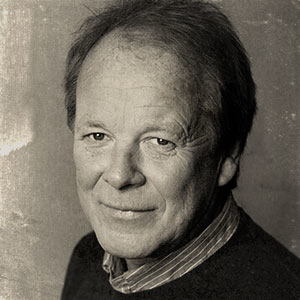Firsthand: How Grammy Winner Bill Oakes Discovered From Here to Eternity
The British-born librettist offers his thoughts on collaborating with the great Tim Rice on this new musical.
Bill Oakes has had a storied career in the entertainment industry. The Nottingham native first gained notoriety as the head of the RSO record label and later served as the music supervisor for the now-legendary films Saturday Night Fever (for which he won a Grammy Award) and Grease. In 2014, his stage adaptation of the film From Here to Eternity, written with Tim Rice and Stuart Bryson, premiered at the Shaftsbury Theatre on London's West End. The production will be broadcast in American cinemas on October 2, 5, and 9. In anticipation of the showings, Oakes wrote for TheaterMania about his experiences bringing the musical to life.

Tim Rice called me and asked me what I knew about From Here to Eternity. Aside from its usefulness as a tombstone inscription, I said — absolutely nothing.
Tim had acquired the theatrical rights to James Jones's classic novel set at the outset of World War Two, with a view to mounting a musical version. Would I be interested in writing the book?
It was a new challenge for me — adapting someone else's story for the stage. But what a story it turned out to be. When the hefty tome appeared on my doorstep I noted that it looked like a very long read. 'So was Les Misérables, said Sir Tim. When I was a mere 100 pages in, I said the story is very dark. So — said Sir Tim — was Les Miserables. Undeterred I soldiered on and soon, without realizing it, I was hooked.
What James Jones wrote — and here I should be clear: our musical is based on his original novel, not the 1953 film version — was an extraordinary up-front-and -personal view of the U.S. Army in the days leading up to the attack on Pearl Harbor.
First, I was struck by its chilling relevance to today: America has suffered two major attacks on its homeland: the first on December 7th 1941, the second on September 11th, sixty years later. Both happened out of the blue, on bright sunny mornings; the casualty counts were almost identical.
Second, I fell hard for Jones's leading characters. Into Private Prewitt he poured all of his own hard-gotten love and anger and disgust and fascination with the Army, turning him into the ultimate fall guy, a tragic Everyman. Prewitt's story doesn't even last the whole book but it was clear to me that, for the musical, he'd be the pivot around which everything else would turn: Sgt Warden, Karen Holmes, the lovely Lorene and (of course) Private Maggio.
A truly faithful version of Jones's masterwork could, like Wagner's Ring Cycle, occupy us for five consecutive nights. And on the face of it, the monotony of military life is hardly conducive to building a show-stopping musical. My third and more crucial misgiving was that so much of what Jones wrote is inside his characters' heads.
But what I realized was that, far from the songs being unnatural intrusions into the drama, they were going to be crucial in letting the characters talk to us, one to one, as if nobody else were there, the actors' dialogue springing seamlessly (I hoped) into lyrics. This seems to me to be the essence of a good musical. And in Tim Rice, of course, I would be working with the best.
Tim and Stuart Brayson, the composer, had written some songs before I started: "G Company Blues", for instance, was a pitch-perfect introduction to life in the barracks. But I was given carte blanche to write the story as I saw it – the only mandate being that each of the lead characters will have their moment in song. And what songs they've turned out to be!
Stuart is a godsend to a writer like myself. Meticulous to a fault yet ever quick to make suggestions; gifted and inspirational, but never one to brood over the sometimes cut-throat business of changing songs.
First night in London was especially memorable. Wedged tight into a row of celebrity peacocks, I quickly found myself absorbed in the story of the Boys of '41, forgetting that it was something I myself had written. I'd always heard that the musical was theater's most collaborative genre and here was the physical evidence: the musicians, the set, the sound, the lights and yes, the actors – all working in concert like the parts of a watch.
But at the interval I stepped outside, into the alley by the stage door, and cast my mind back to a few years earlier…
From Here To Eternity, Tim was saying to me — why don't you give it a try, see what you come up with? And my response, still ringing in my ears: "I don't much care for musicals, they seem so unnatural". "Then write the one" — Tim said — "that you would like to see."
Take a look at From Here to Eternity below:
Click here for showtimes and tickets to From Here to Eternity.









